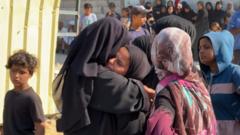As Israel initiates a "tactical pause" in military operations, Jordan and the UAE have air-dropped aid into Gaza to address the escalating humanitarian crisis. Reports indicate continued violence, with casualties near aid routes, prompting concern from international leaders regarding the sufficiency of current aid measures.
Jordan and UAE Provide Aid to Gaza Amid Israel's Tactical Pause

Jordan and UAE Provide Aid to Gaza Amid Israel's Tactical Pause
Humanitarian efforts intensify as Jordan and the UAE deliver aid to Gaza, even as Israel implements a temporary truce amid ongoing conflict.
Jordan and the United Arab Emirates (UAE) have commenced air dropping aid into Gaza in response to Israel's recently announced "tactical pause" in its military activities. This pause was implemented to alleviate the growing humanitarian disaster gripping the enclave, where many residents are facing dire conditions. Jordan’s military confirmed the delivery of 25 tonnes of aid in three separate air drops on Sunday, coinciding with a lorry convoy entering Gaza from Egypt. Another convoy from Jordan is also scheduled for arrival in the coming days.
Israel stated it would suspend military operations for a period of 10 hours per day in specific regions of Gaza, allowing for dedicated aid corridors to counter claims of intentional starvation in the area. However, local medical sources reported nine fatalities and over 50 injuries from Israeli fire near an aid convoy route in central Gaza, raising questions regarding the safety and effectiveness of the aid delivery efforts.
Reports from witnesses indicate that an airstrike struck a residential building shortly after the pause was declared on Saturday, leading to further alarm amidst ongoing hostilities. BBC Verify has confirmed the location of airstrikes based on geolocating evidence, contradicting statements from the Israeli Defense Forces (IDF), which claim ignorance about the incidents.
In desperation, Gazans have flooded food aid distributions, with reports indicating that a significant portion of the population has gone days without sustenance. The United Nations’ World Food Programme has warned that one-third of Gaza’s two million residents are not receiving food regularly, with many enduring starvation-like conditions. The UK’s Foreign Secretary, David Lammy, emphasized that while the recent air drops provide some relief, permanent land routes must be opened for a sustainable solution to Gaza's suffering.
Volker Türk, the UN High Commissioner for Human Rights, has called for heightened international demands to halt the conflict, cautioning that every passing day entails more destruction and loss of life. Former President Donald Trump noted that while additional aid will be sent to Gaza, the issue requires international collaboration, asserting that it cannot be managed by the US alone.
While the temporary pause has been cautiously welcomed by Gaza’s residents, many remain skeptical about its efficacy in addressing the ongoing crisis. Local residents express a mix of hope and concern, fearing the imminent return to starvation once the ceasefire ends. In response to the situation, Israel’s Prime Minister Benjamin Netanyahu reiterated his commitment to military objectives, asserting that the nation would continue its operations until all war goals are achieved, while maintaining that adequate routes for aid have always been available.
Under the new guidelines, ongoing military confrontations will be put on hold in the Al-Mawasi, Deir al-Balah, and Gaza City regions daily for ten hours, paving the way for UN and humanitarian organizations to provide crucial supplies to the residents of Gaza. This current phase of conflict, which erupted following a Hamas-led attack on Israel on October 7, has resulted in extensive loss of life, with over 59,000 fatalities reported in Gaza, and is viewed as a critical moment for potential humanitarian relief amidst relentless warfare.



















